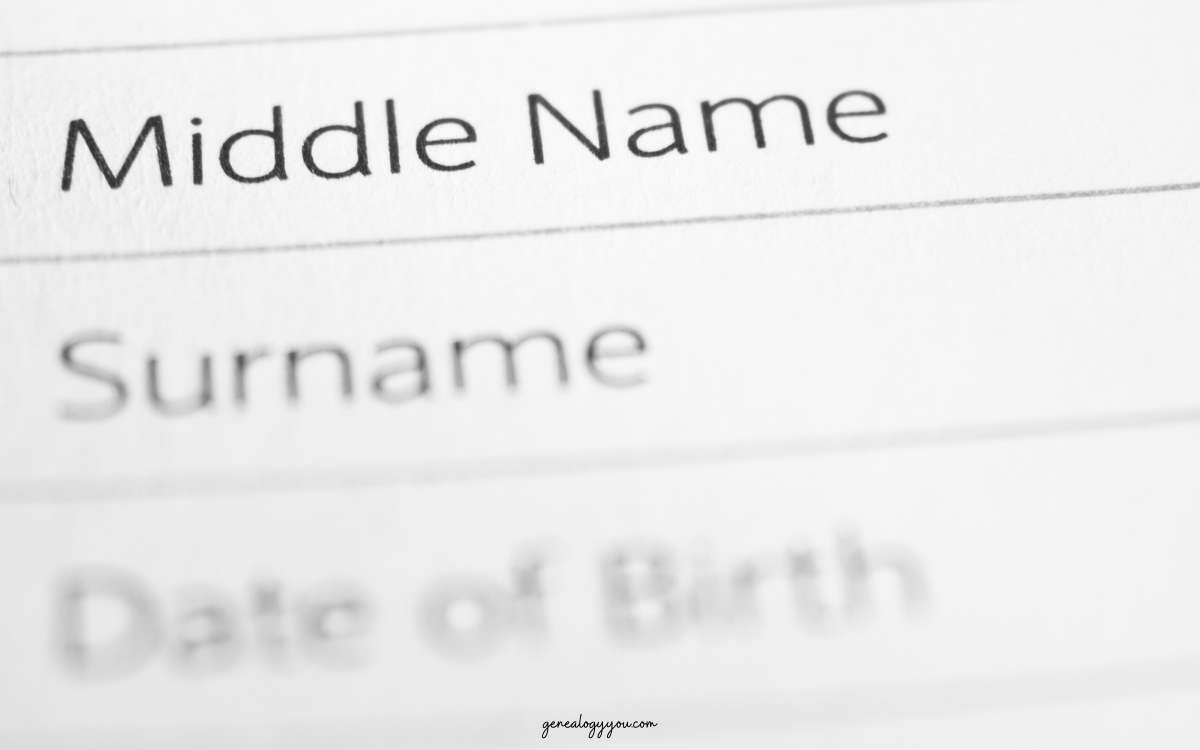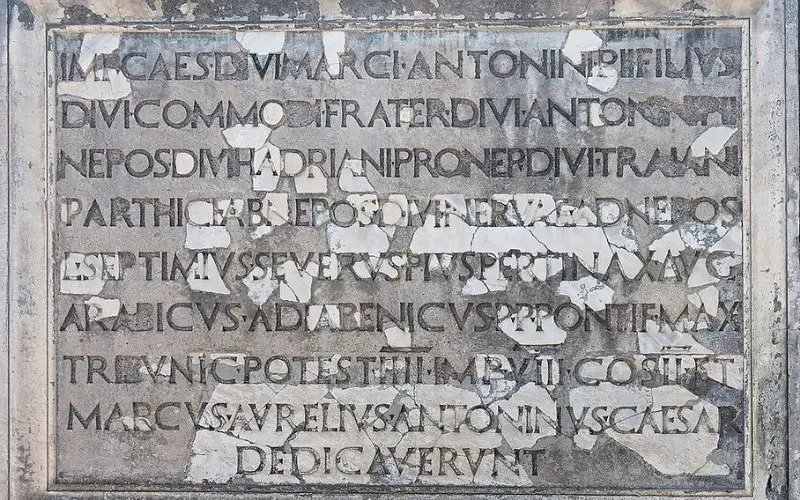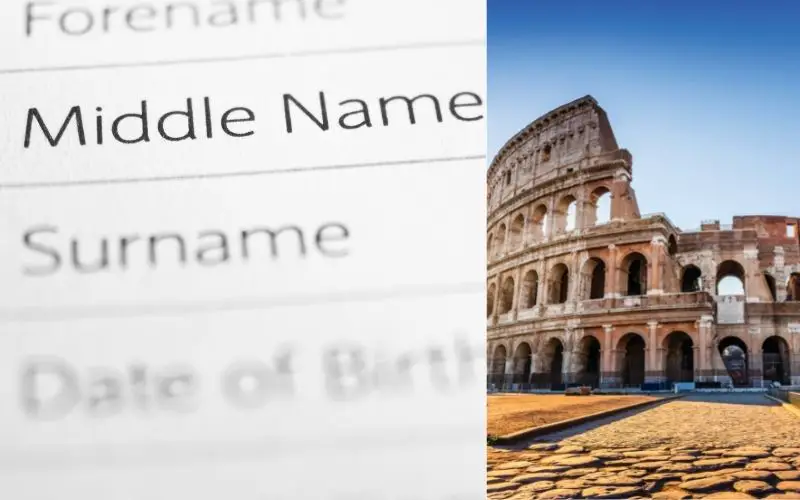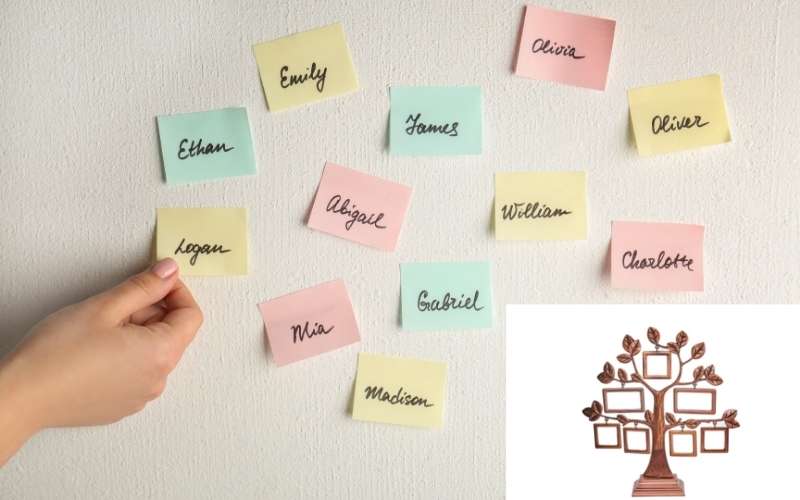Inside: If you’ve ever wondered why do people have middle names, we’ve got all the answers you seek in this entertaining explainer.
“What’s in a name? That which we call a rose by any other name would smell as sweet,” Juliet thought aloud in regards to the plight she faced with her love.
While she wasn’t talking about her middle name, the whole story of Romeo and Juliet by Shakespeare shows how powerful a name can be and, therefore, how each part holds significance.

Middle names are quite the topic of conversation these days, for women in particular. For many years, women tended to drop their maiden name to incorporate the new life phase of being a married woman.
However, women are now getting married at a much later age than their grandmothers and even mothers. So, it seems the ladies have become all the more attached to their name as it is.
What that’s created now is an opportunity to do something different with names.
Instead of dropping the original last name and replacing it, we’re now seeing the middle name be dropped in an effort to keep the last name that has become an important part of an identity.
As our naming priorities change, what will that mean for the future of middle names?
A History of Middle Names

Before we can think about what our names might look like in a hundred years, let’s take a moment to explore how we got here in the first place.
Long before we welcomed the first presidential middle names, kicking off with John Quincy Adams, there was an ancient civilization that was ahead of its time.
Our journey starts over two thousand years ago in Rome. That’s when we saw three names coming about, but not for everyone.
As with many things in history, the three names applied to men with standing in society.
They had a first name, similar to the way we select names today. Their second name was in relation to their family.
The third was another family name or nickname in relation to something about the man. One of the most recognizable uses of a middle name in history is from Gaius Julius Caesar.
As for the many Romans who were women or slaves, they had two names or one respectively. All rules were thrown out the window, however, if you were of noble birth to aristocratic families.
To show lineage, there would often be several names for one person. That’s the modern-day equivalent of having a collection of luxury cars or designer handbags. The extra names correlate to the extra funds you were born into.
As with all trends, giving someone names numbering in the double digits eventually calmed into extinction.
For a while, we went back to calling people by their personal name in attachment to the town they were from when they traveled or the name of their father when they were local.
Rise of Occupational Surnames

By the 11th century, being on a first-name basis was quickly proving a cumbersome system.
People needed better and more organized identifiers. After all, there can only be so many men named Thomas before it becomes impossible to not get confused.
Now we usher in a new age with occupational surnames.
If your father was Harry and he made pots for a living, he would become known as Harry Potter.
So, when you were born, he wasn’t just passing down his name but also his profession. You are Albus Potter but you don’t make pots.
That’s okay, perhaps you can write down the life and times of your dad in a Harry Potter series. Either way, that’s how the last name became a thing.
Similar to John Smith, here are some more examples of family names that come from jobs:
- Archer
- Brewer
- Carver
- Farmer
- Hunter
- Miller
- Sheppard
- Tanner
- Weaver
Middle Ages and Middle Names
Now that we have begun establishing last names and creating family empires, it’s time to add more identifiers.
Italy decided, since its own ancient Rome was the trend starter all those years ago, that it would bring back the time of middle names once more.
Middle names started popping up in the region somewhere around the late 1200s. When the practice of middle names spread across Europe, as it did a thousand years prior, middle names started with the upper classes.
It took a couple of hundred years to become a cultural expectation to endow your child with a middle name.
In the early days of the resurgence, it was fairly common to give religious middle names that were inspired by saints.
Thanks to a historian of the day, we know that it was happening in England during the first decade of the 17th century, to a lesser extent anyway. William Camden noted, “Two Christian names are rare in England.”
That, too, would change in the following century when most children of the British population are registered with two given names ahead of their surname.
What is the point of a middle name?

As you might have surmised by now, middle names show up in history when they are most helpful. Middle names started in Rome, which makes sense, being it was heavily populated and had a full-on class system going on.
Then, after the dissolution of the empire to the west, people spread out again. The middle name went out of vogue as people weren’t really traveling and mostly habituated in small towns.
Once things like crusades, plagues, and world domination were picking back up, it was again necessary to be able to get more specific about which Francis of Navarre was coming to town.
Oh yeah, let’s not forget it aided the tax collector, too.
Benefits of a Middle Name
With the world population only going up from here, it’s unlikely we’ll see another period of time where middle names are superfluous.
Not only does it help pinpoint who you are in a world where thousands of people could share your first and last name, but a middle name also gives you options.
A majority of people connect with their name as toddlers and grow into it as they reach adulthood. However, there are plenty of people who, for whatever reason, do not like their name.
Having a middle name means you aren’t stuck with a name you loathe.
That can also go for the last name that someone doesn’t want to share, as well. A middle name can be a gift for someone in either of those positions.
There are plenty of example celebrities who fit that category:
- Robyn Rihanna Fenty
- Joseph Jason Namakaeha Momoa
- Vera Mindy Chokalingam
- Angelina Jolie Voigt
- Lea Michele Sarfati
Middle Names Around the World
Various cultures have embraced middle names in unique ways that differ from western culture. Below are some common traditions from other countries:
- China. Chinese names are put together using three characters. What comprises these characters are the surname and a two-character name given by the parents. The given name characters include a generation nod. It’s not exactly a middle name, but it has three components. Chinese-Americans often use their given name as a middle name and pick something English as a first.
- India. Another one of the most populated countries, India, has a wide range of cultures, religions, and histories that give their own take on names. For example, Hindus have a first, middle, and last name set up but use it as a way to pay homage. A middle name is often the father’s name. When a Hindu woman gets married, she has the option to change that name to her spouse’s and follow it with the new family’s caste.
- The Philippines. As a way to keep paternal or maternal names in the family, middle names are the mother’s maiden names. Using a middle initial when writing out the name keeps the maternal side part shown for years to come.
- Saudi Arabia. Arabic-speaking countries have a naming system that doesn’t have a middle name, per se. They do have a handful of names that combine to create a proper name. That’s because the first name is followed by the father’s name, the grandfather’s name, and the family name. You will likely see Bin, meaning son of, and at the end, Al, which means the and is followed by the family name.
- Ghana. There’s a variety of languages and ethnicities in Ghana but most babies have multiple names to call their own. A popular naming practice is to give one of the names based on the day they were born. Middle names have more elbow room as they are derived from an ancestor, birth order, or to let the world know if they are a twin.
The Future of Middle Names

As you can tell from the last section, there is no right or wrong way to name a middle name or otherwise. Some people like to keep it in the ancestry and use names from the family tree.
Others like to assimilate to wherever they currently reside and pick names common to the ethnicities around them.
Some middle names are gathered from other types of significance, others are for the fun of it.
Middle names have a purpose but the way we choose names will likely fluctuate as we march forward in time. These are the most popular middle names for girls in modern times:
- Marie
- Grace
- Rose
These are the top from previous generations a century ago:
- Mae
- Marie
- Louise
Finally, a prediction for the future:
- Nova
- Rey
- Luna
Clearly, if this is anywhere near accurate, we like to keep it simple. Not sure if that is a great thing or not, considering attention spans are getting lower.
Nevertheless, continuing the common tradition of middle names appears to be something we can rely on.
Who knows, the population may become so big and intertwined with other naming systems that it will eventually become commonplace to have two middle names.
Maybe we will go the way of Elon Musk and Grimes by adding symbols and even numbers to names, in an effort to keep them unique.
Either way, by any name, the future smells sweet.
Related:
